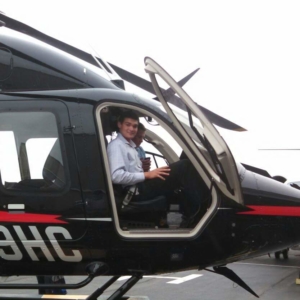Bykowsky believes that companies prefer students who are graduating soon, since there’s a higher chance they’ll be seeking a full-time position. “As a freshman, and even as a sophomore, it’s tough to get companies to hire you, because there’s a pretty low ROI for bringing you onboard,” he says.
He recommends asking for “informal interviews” once potential contacts are made. In an informal interview, you can discuss the contact’s work, and at the end of the conversation, ask for help securing an internship.
FOCUS ON THINGS YOU’RE REALLY INTERESTED IN
Another key piece of advice is to focus on your personal interests, even if it doesn’t seem like a traditional place to look. Bykowsky got his own freshman-year internship this way.
He’s from Columbia, South Carolina, and shortly after arriving at Carnegie Mellon, he started to miss the South. He wanted to go fishing, he said, so he started the school’s first fishing club. His involvement with the club led him to enter a competition with Fenwick Rods.
He won, and got an internship with Pure Fishing Marketing and Product Development.
CLIMBING THE INTERNSHIP LADDER
Once you have that first internship, things get a little easier, Bykowsky says. His sophomore-year summer he worked as a corporate sponsorship and marketing intern at TexTron, a company that manufactures aircraft, industrial, and automotive products. The following summer, he interned at Proctor & Gamble.
“At Pure Fishing I was the only intern, and it was pretty low-pressure because of that. At Textron there was a larger internship program, and Proctor & Gamble was the epitome of a competitive internship,” Bykowsky says.
He recommends trying to get internships before your junior year, even if they’re at small companies. “You learn how to behave in a corporate environment,” he says. “At Proctor & Gamble there was a high bar, and the entire experience felt like it was a test to see how good I was. You have to be on your toes and turn out really good product to ensure a return offer.”
He did get an offer to return to Proctor & Gamble full-time, but declined in favor of McKinsey — an opportunity that he wouldn’t have gotten without his internship experience.
“You learn so much in such a short amount of time. Going from being a business student inside a lower-level Fortune 500, to a mid-tier Fortune 500’s corporate offices, to Proctor & Gamble, to McKinsey — I took four steps up really, really quickly,” Bykowsky says. “And in the real world, you don’t have the opportunity to move up the ranks that quickly, or switch jobs that much. So the earlier you can start, the earlier you can start doing that.”












Questions about this article? Email us or leave a comment below.